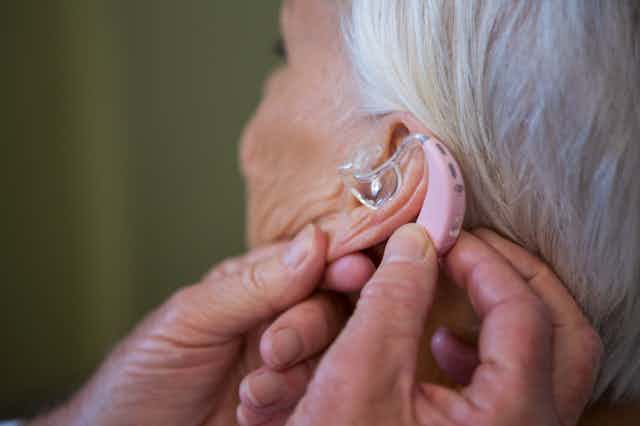Most care home residents have both dementia and hearing loss, which can leave them feeling lonely and depressed.
Hearing loss and dementia both cause difficulties with listening, understanding and communicating. This can lead to breakdowns in relationships because something as simple as a conversation with a loved one can become impossible.
People with dementia often don’t know, or can’t communicate, that they have problems with their hearing. This means that a lot of the time, their carers don’t know either.
Crucially, many people with dementia, and especially those living in care homes, rely on carers to support their hearing needs. This might mean helping with hearing aids or other hearing devices, using communication techniques, writing things down or using flashcards and making sure background noise isn’t too loud.
When hearing care is given properly it can improve residents’ quality of life, mood and engagement with peers. Unfortunately, in a new study, my colleagues and I found that only 50% of residents with dementia in UK care homes are given help with their hearing loss.
Poorly supported hearing loss leaves residents at risk of emotional and behavioural problems, worsened confusion and difficulties communicating with important people in their life like family, friends, carers and healthcare professionals. In the same study, just 27% of care staff said that they check that residents’ hearing aids are working properly. This is a huge problem as most residents with dementia aren’t able to do this themselves.
Complicated reasons
The survey results also revealed that the reasons residents with dementia aren’t receiving help with their hearing are complicated. The biggest problem in care homes appears to be access to resources, such as enough time, enough staff or enough things like hearing aid batteries or flashcards. Staff who completed the survey said that not enough resources in the care homes made it difficult to provide hearing-related care to residents with dementia.
Another part of the problem is that care staff don’t always have the relevant knowledge and skills to help residents with their hearing problems. Just under 25% of staff reported having had any training on hearing loss (despite over 75% of residents having hearing loss), but almost all said that they wanted this training to be provided.
Hearing loss isn’t always prioritised in care homes. Compared to dehydration, infections or injuries, hearing and communication problems don’t cause immediate risk or physical harm to residents. So helping residents to hear well isn’t often a priority for staff, who have limited time and a heavy workload. That doesn’t mean that hearing and communicating aren’t essential for a person’s wellbeing and happiness.

Results from our survey show that people with dementia living in care homes are not getting the care that they need and deserve to help them to hear, understand and communicate. Care home residents are often very vulnerable, and being able to hear well is essential to maintaining a good quality of life and engaging with mentally stimulating activities.

